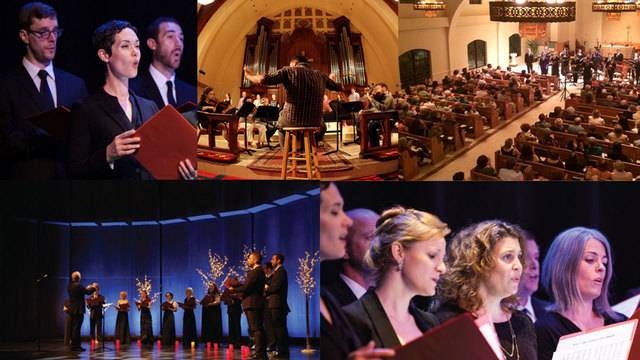
Seraphic Fire presents selections from its 2012 Grammy nominated recording A Seraphic Fire Christmas in a candlelit performance of English carols and transcendent chants this Friday evening at First United Methodist Church, 536 Coral Way in Coral Gables. Selections include O Come All Ye Faithful, Ave Maria, Jesus Christ the Apple Tree, Tomorrow Shall Be My Dancing Day, Adeste Fideles, Silent Night and many more. Tickets are available online at www.seraphicfire.org and at First United Methodist Church on the day of performance. Concert starts at 7:30 pm.
South Florida Classical Review posted this review by David Fleshler of last Thursday’s performance of A Seraphic Fire Christmas:
In a darkened, candlelit church Thursday evening, male voices intoned a medieval chant, as the choir Seraphic Fire began a Christmas concert that was lustrously sung and imaginatively programmed, if not particularly merry.
The Miami-based choir’s annual holiday concerts are a South Florida tradition, as the vocal ensemble’s 13 top-flight singers bring a repertory that spans 1,000 years to churches around the region. As always, despite the occasional soaring passage of religious ecstasy and the presence of a few popular carols, the tone was was of spiritual solemnity.
The Christmas they expressed was the holy day on the Christian calendar, as observed, if not precisely celebrated, in churches for centuries. No gifts, no ornaments, no eggnog. Although there are a lot of new faces in the choir this year, the ensemble sang with their usual perfect intonation, unity, precision and tonal richness, under the direction of conductor James K. Bass.
The concert, held at St. Gregory’s Episcopal Church in Boca Raton, opened with the chant Pater Noster, with male voices singing the unharmonized notes from the back of the church. Women joined in from the front, and the music soon progressed a millennium or so to the brighter tones and complex harmonies of Maurice Duruflé’s Tota Pulchra Es, sung with affecting emotion.
They sang several carols, many arranged by Seraphic Fire founder Patrick Dupré Quigley: “O Come, All Ye Faithful,” “O Little Town of Bethlehem,” “Silent Night,” and, as an encore, “We Wish You a Merry Christmas.”
With the exception of the encore, even the carols sounded spare and centuries old, the occasional modernist harmonies feeling closer to the dark-hued medieval works that opened the program than to the usual bright background music that will plague shoppers until Dec. 26. If the choir ever added the “Chipmunks Christmas Song” to their repertory, it would likely sound as if it were performed at Cologne Cathedral in 1450.
The most interesting works were not the famous carols but rather the lesser-known holiday compositions, both ancient and modern.
Among these were two world premieres. All Beautiful the March of Days by James Kallembach, a Chicago-based contemporary composer, sets a text by Frances Whitmarsh Wile. Opening with stately phrases that could almost have come from a 19th-century hymnal, the work becomes engagingly turbulent, complex and emotional before returning to the serenity of its opening notes.
The other world premiere was an arrangement by Quigley of Jesús en pesebre (by William James Kirkpatrick and James R. Murray) an affecting setting of familiar Christmas melodies. Among the familiar tunes was “Away in a Manger,” where long-held chords in the chorus set off the melodies sung with radiant grace and tone by the soprano Sara Guttenberg.
O Magnum Mysterium by the contemporary composer Morton Lauridsen was particularly haunting and affecting, with climactic dissonances that broke to further dissonances before finally resolving, all made especially searing by the clarity and purity of the singing.
In “Once in Royal David’s City” by the 19th-century English composer Henry John Gauntlett, soprano Sarah Moyer sang without vibrato to bring to her solo a tone of sweet, unaffected purity.
The popular “Lo’ How a Rose ‘er Blooming” by Michael Praetorius, sung with soft-edged tones, was stately and evocative of a 17th-century English cathedral. “Tomorrow Shall be My Dancing Day,” a traditional tune arranged by the English composer and conductor David Wilcox, was one of the few quick, upbeat works, bursting with joy and lively energy. “The Lamb” by John Tavener, contained poignant dissonances at its emotional climax, drawn out and made emphatic by the singers.
The dazzling showstopper “Jesus Christ the Apple Tree” by Elizabeth Poston, is a perennial work on Seraphic Fire’s Christmas programs, typically saved for the end. Beginning with a lone female voice, it builds as members of the choir station themselves around the church, each singing an individual part for a unique and unforgettable polyphonic experience. With a lesser choir, the arrangement would have become a blur. As sung by Seraphic Fire, with all the individual voices coming through clearly, it was an overwhelming display of sonic power and vocal virtuosity.





